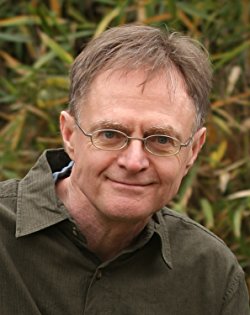Richard Heinberg
( Writer, educator, environmentalist) | |
|---|---|
 | |
| Born | Richard William Heinberg 21 October 1950 |
| Nationality | USA |
| Spouse | Janet Barocco |
| Interests | |
Warns of Peak Oil. | |
Richard Heinberg has helped raise awareness about Peak Oil, and continues to do so.
Early life
Heinberg grew up in St. Joseph, Missouri. His father, William Heinberg, was a chemist and high-school physics and chemistry teacher. Heinberg's interest in science came from his father, but at an early age, he rejected his parents' fundamentalist Christian beliefs. At one point he lived at Colorado's Sunrise Ranch, headquarters the " Emissaries of Divine Light" group, which Heinberg called "a sort of benign cult."[1]
Career
Heinberg, after two years in college and a period of personal study, became personal assistant to Immanuel Velikovsky in November 1979. After Velikovsky's death, Heinberg assisted his widow in editing manuscripts.[2][3] He published his first book in 1989, Memories and Visions of Paradise: Exploring the Universal Myth of a Lost Golden Age,[4] which was the result of ten years of study of world mythology. An expanded second edition was published in 1995.[5] He began publishing his alternative newsletter, the MuseLetter, in 1992. His next book was published in 1993: Celebrate the Solstice: Honoring the Earth's Seasonal Rhythms through Festival and Ceremony.[6]
In June 1995, speaking to the International Society for the Comparative Study of Civilizations in Dayton, Ohio, Heinberg provided "A Primitivist Critique of Civilization" and discussed the ways in which "We are, it would seem, killing the planet."[7]
His books from the later 1990s address the relationships between humanity and the natural world. In 1998, he began teaching at New College of California.[8] in the "Culture, Ecology and Sustainable Community" program, which he helped design. He remained a member of the Core Faculty until 2007, when the College closed its doors.
Heinberg's The Party's Over: Oil, War, and the Fate of Industrial Societies, published in 2003, was one of the first full-length analyses of peak oil.
In 2004, Heinberg provided the closing address for the First US Conference on Peak Oil and Community Solutions. His title was "Beyond the Peak."
In February 2007, Heinberg addressed the Committee on International Trade of the European Parliament and served as an advisor to the National Petroleum Council in its report to the U.S. Secretary of Energy on Peak Oil. In 2008 he was a Mayor's appointed member of the Oil Independent Oakland 2020 Task Force (Oakland, California),[9] which was convened to chart a path for the city to dramatically reduce its petroleum dependence.
Heinberg is now the Senior Fellow of the Post Carbon Institute in Santa Rosa, California. He is also a violinist, illustrator, and book designer. He is married to Janet Barocco.
Heinberg has proposed an international protocol to peak oil management with the aim of reducing the impact of the arrival of the peak.[10] The adoption of the Protocol would mean that oil-importing nations should deal to reduce their importations in an annual percentage, while exporting countries should deal to reduce their exportation in the same percentage. The Uppsala Protocol[11] has been focused in a similar direction.
Heinberg is the editor of MuseLetter,[12]. He has appeared in the documentaries The End of Suburbia, The 11th Hour, Crude Impact, Oil, Smoke & Mirrors, Chasing God, What a Way to Go: Life at the End of Empire, The Great Squeeze, The Power of Community: How Cuba Survived Peak Oil, A Farm for the Future and Ripe For Change.
Heinberg serves on the advisory board of The Climate Mobilization, a grassroots advocacy group calling for a national economic mobilization against climate change on the scale of the home front during World War II, with the goal of 100% clean energy and net zero greenhouse gas emissions by 2025.[13]
Books
- The Party's Over: Oil, War, and the Fate of Industrial Societies (2003)
- Powerdown: Options and Actions for a Post-Carbon World
- The Oil Depletion Protocol: A Plan to Avert Oil Wars, Terrorism and Economic Collapse (2006)
- Peak Everything: Waking Up to the Century of Declines (2007).
A Document by Richard Heinberg
| Title | Document type | Publication date | Subject(s) |
|---|---|---|---|
| File:Searching for a Miracle.pdf | report | September 2009 | Peak Oil Energy Alternative energy |
References
- ↑ https://web.archive.org/web/20070523175710/https://www.thesunmagazine.org/367_Heinberg.pdf
- ↑ Contributors. Kronos VI(2), Winter 1981.
- ↑ Sammer, Jan. The Velikovsky Archive. Aeon VI(2), Dec. 2001.
- ↑ Los Angeles, Calif.: Tarcher. 282 pp.
- ↑ Wheaton, Ill,: Quest Books. 294 pp..
- ↑ Wheaton, Ill.: Quest Books. 199 pp. .
- ↑ http://www.primitivism.com/primitivist-critique.htm
- ↑ https://books.google.com/books?id=e_v2rXL6rYwC&q=Richard+Heinberg+new+college+1998&pg=PA172%7Ctitle=World Energy Crisis: A Reference Handbook|date=2013|
- ↑ https://web.archive.org/web/20130525163917/http://www.oaklandnet.com/Oil/default.html
- ↑ https://heinberg.wordpress.com/2007/06/01/182-the-oil-depletion-protocol-an-update/
- ↑ Protocol of Uppsala
- ↑ http://heinberg.wordpress.com/
- ↑ http://www.theclimatemobilization.org/advisory_board
Wikipedia is not affiliated with Wikispooks. Original page source here